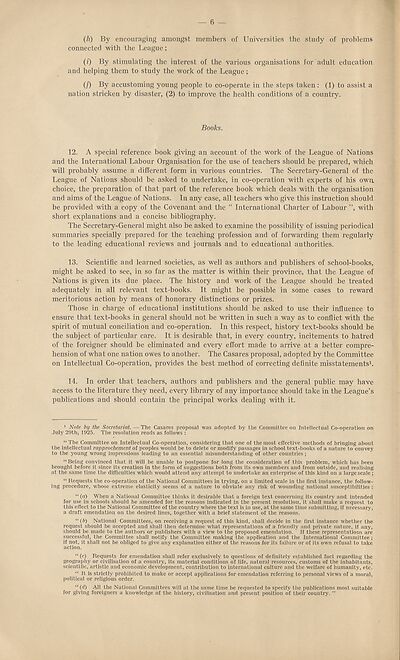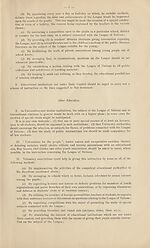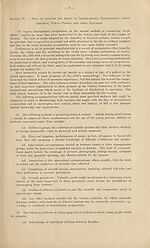Download files
Complete book:
Individual page:
Thumbnail gallery: Grid view | List view

— 6 —
(h) By encouraging amongst members of Universities the study of problems
connected with the League;
(z) By stimulating the interest of the various organisations for adult education
and helping them to study the work of the League;
(/) By accustoming young people to co-operate in the steps taken: (1) to assist a
nation stricken by disaster, (2) to improve the health conditions of a country.
Books.
12. A special reference book giving an account of the work of the League of Nations
and the International Labour Organisation for the use of teachers should be prepared, which
will probably assume a different form in various countries. The Secretary-General of the
League of Nations should be asked to undertake, in co-operation with experts of his own.
choice, the preparation of that part of the reference book which deals with the organisation
and aims of the League of Nations. In any case, all teachers who give this instruction should
be provided with a copy of the Covenant and the “ International Charter of Labour ”, with
short explanations and a concise bibliography.
The Secretary-General might also be asked to examine the possibility of issuing periodical
summaries specially prepared for the teaching profession and of forwarding them regularly
to the leading educational reviews and journals and to educational authorities.
13. Scientific and learned societies, as well as authors and publishers of school-books,
might be asked to see, in so far as the matter is within their province, that the League of
Nations is given its due place. The history and work of the League should be treated
adequately in all relevant text-books. It might be possible in some cases to reward
meritorious action by means of honorary distinctions or prizes.
Those in charge of educational institutions should be asked to use their influence to
ensure that text-books in general should not be written in such a way as to conflict with the
spirit of mutual conciliation and co-operation. In this respect, history text-books should be
the subject of particular care. It is desirable that, in every country, incitements to hatred
of the foreigner should be eliminated and every effort made to arrive at a better compre¬
hension of what one nation owes to another. The Casares proposal, adopted by the Committee
on Intellectual Co-operation, provides the best method of correcting definite misstatements1.
14. In order that teachers, authors and publishers and the general public may have
access to the literature they need, every library of any importance should take in the League’s
publications and should contain the principal works dealing with it.
1 Note by the Secretariat. — The Casares proposal was adopted by the Committee on Intellectual Co-operation on
July 29th, 1925. The resolution reads as follows :
“ The Committee on Intellectual Co-operation, considering that one of the most effective methods of bringing about
the intellectual rapprochement of peoples would be to delete or modify passages in school text-books of a nature to convey
to the young wrong impressions leading to an essential misunderstanding of other countries ;
“Being convinced that it will be unable to postpone for long the consideration of this problem, which has been
brought before it since its creation in the form of suggestions both from its own members and from outside, and realising
at the same time the difficulties which would attend any attempt to undertake an enterprise of this kind on a large scale ;
“ Requests the co-operation of the National Committees in trying, on a limited scale in the first instance, the follow¬
ing procedure, whose extreme elasticity seems of a nature to obviate any risk of wounding national susceptibilities :
“ (a) When a National Committee thinks it desirable that a foreign text concerning its country and intended
for use in schools should be amended for the reasons indicated in the present resolution, it shall make a request to
this effect to the National Committee of the country where the text is in use, at the same time submitting, if necessary,
a draft emendation on the desired lines, together with a brief statement of the reasons.
“(b) National Committees, on receiving a request of this kind, shall decide in the first instance whether the
request should be accepted and shall then determine what representations of a friendly and private nature, if any,
should be made to the authors or publishers with a view to the proposed emendation. If these representations are
successful, the Committee shall notify the Committee making the application and the International Committee;
if not, it shall not be obliged to give any explanation either of the reasons for its failure or of its own refusal to take
action.
“ (c) Requests for emendation shall refer exclusively to questions of definitely established fact regarding the
geography or civilisation of a country, its material conditions of life, natural resources, customs of the inhabitants,
scientific, artistic and economic development, contribution to international culture and the welfare of humanity, etc.
“ It is strictly prohibited to make or accept applications for emendation referring to personal views of a moral,
political or religious order.
“ (d) All the National Committees will at the same time be requested to specify the publications most suitable
for giving foreigners a knowledge of the history, civilisation and present position of their country. ”
(h) By encouraging amongst members of Universities the study of problems
connected with the League;
(z) By stimulating the interest of the various organisations for adult education
and helping them to study the work of the League;
(/) By accustoming young people to co-operate in the steps taken: (1) to assist a
nation stricken by disaster, (2) to improve the health conditions of a country.
Books.
12. A special reference book giving an account of the work of the League of Nations
and the International Labour Organisation for the use of teachers should be prepared, which
will probably assume a different form in various countries. The Secretary-General of the
League of Nations should be asked to undertake, in co-operation with experts of his own.
choice, the preparation of that part of the reference book which deals with the organisation
and aims of the League of Nations. In any case, all teachers who give this instruction should
be provided with a copy of the Covenant and the “ International Charter of Labour ”, with
short explanations and a concise bibliography.
The Secretary-General might also be asked to examine the possibility of issuing periodical
summaries specially prepared for the teaching profession and of forwarding them regularly
to the leading educational reviews and journals and to educational authorities.
13. Scientific and learned societies, as well as authors and publishers of school-books,
might be asked to see, in so far as the matter is within their province, that the League of
Nations is given its due place. The history and work of the League should be treated
adequately in all relevant text-books. It might be possible in some cases to reward
meritorious action by means of honorary distinctions or prizes.
Those in charge of educational institutions should be asked to use their influence to
ensure that text-books in general should not be written in such a way as to conflict with the
spirit of mutual conciliation and co-operation. In this respect, history text-books should be
the subject of particular care. It is desirable that, in every country, incitements to hatred
of the foreigner should be eliminated and every effort made to arrive at a better compre¬
hension of what one nation owes to another. The Casares proposal, adopted by the Committee
on Intellectual Co-operation, provides the best method of correcting definite misstatements1.
14. In order that teachers, authors and publishers and the general public may have
access to the literature they need, every library of any importance should take in the League’s
publications and should contain the principal works dealing with it.
1 Note by the Secretariat. — The Casares proposal was adopted by the Committee on Intellectual Co-operation on
July 29th, 1925. The resolution reads as follows :
“ The Committee on Intellectual Co-operation, considering that one of the most effective methods of bringing about
the intellectual rapprochement of peoples would be to delete or modify passages in school text-books of a nature to convey
to the young wrong impressions leading to an essential misunderstanding of other countries ;
“Being convinced that it will be unable to postpone for long the consideration of this problem, which has been
brought before it since its creation in the form of suggestions both from its own members and from outside, and realising
at the same time the difficulties which would attend any attempt to undertake an enterprise of this kind on a large scale ;
“ Requests the co-operation of the National Committees in trying, on a limited scale in the first instance, the follow¬
ing procedure, whose extreme elasticity seems of a nature to obviate any risk of wounding national susceptibilities :
“ (a) When a National Committee thinks it desirable that a foreign text concerning its country and intended
for use in schools should be amended for the reasons indicated in the present resolution, it shall make a request to
this effect to the National Committee of the country where the text is in use, at the same time submitting, if necessary,
a draft emendation on the desired lines, together with a brief statement of the reasons.
“(b) National Committees, on receiving a request of this kind, shall decide in the first instance whether the
request should be accepted and shall then determine what representations of a friendly and private nature, if any,
should be made to the authors or publishers with a view to the proposed emendation. If these representations are
successful, the Committee shall notify the Committee making the application and the International Committee;
if not, it shall not be obliged to give any explanation either of the reasons for its failure or of its own refusal to take
action.
“ (c) Requests for emendation shall refer exclusively to questions of definitely established fact regarding the
geography or civilisation of a country, its material conditions of life, natural resources, customs of the inhabitants,
scientific, artistic and economic development, contribution to international culture and the welfare of humanity, etc.
“ It is strictly prohibited to make or accept applications for emendation referring to personal views of a moral,
political or religious order.
“ (d) All the National Committees will at the same time be requested to specify the publications most suitable
for giving foreigners a knowledge of the history, civilisation and present position of their country. ”
Set display mode to:
![]() Universal Viewer |
Universal Viewer | ![]() Mirador |
Large image | Transcription
Mirador |
Large image | Transcription
Images and transcriptions on this page, including medium image downloads, may be used under the Creative Commons Attribution 4.0 International Licence unless otherwise stated. ![]()
| League of Nations > International > International committee on intellectual co-operation > (6) |
|---|
| Permanent URL | https://digital.nls.uk/195219333 |
|---|
| Shelfmark | LN.XII |
|---|
| Description | Over 1,200 documents from the non-political organs of the League of Nations that dealt with health, disarmament, economic and financial matters for the duration of the League (1919-1945). Also online are statistical bulletins, essential facts, and an overview of the League by the first Secretary General, Sir Eric Drummond. These items are part of the Official Publications collection at the National Library of Scotland. |
|---|---|
| Additional NLS resources: |
|

